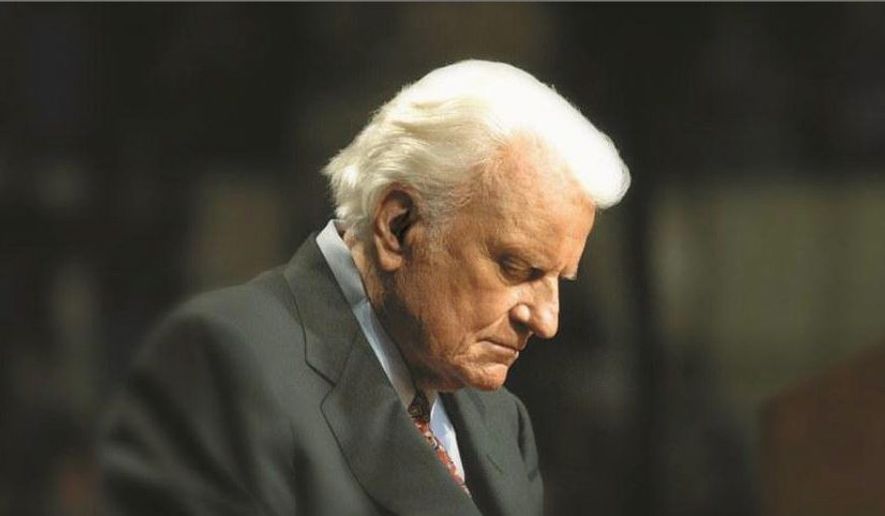In 1973, the Rev. Billy Graham preached to tens of thousands in St. Louis, Missouri, lamenting that America as a nation was under God’s judgment for the U.S. Supreme Court decision made earlier that year legalizing the mass murder of children. He warned that unless believers sought repentance to reverse this atrocity, our nation would be taken away from us as was the case of the Babylonian Achaemenid Empire circa 500 B.C.
Mr. Graham paraphrased Daniel’s conversation with King Belshazzar recorded in Daniel chapter 5. Belshazzar’s empire’s military might was unparralled and its cultural and social influences spanned from modern day Iran to Greece, Egypt, and Libya. Yet he was frightened by handwriting that appeared on his palace wall: “Mene, mene, Tekel, and Parsin.” Daniel interpreted it, explaining his kingdom was being destroyed at that very moment and it was too late to do anything about it. The Medes and Persians were invading. Belshazzar was killed that night and his country fell to King Darius, the Persian Empire’s third ruler.
Mr. Graham remarked that the leaders of one of the greatest nations on earth chose rebellion — and hell — because they rejected God. He said such leaders are “like a mouse still nibbling on cheese after being caught in a trap. They’re already dead!”
Mr. Graham admonished Christians to repent then, and 42 years later Louisiana Gov. Bobby Jindal is doing the same. Not only has he invited Americans to join him Jan. 24th at The Response: Louisiana: A Call to Prayer for a Nation in Crisis, but he wrote to his 49 gubernatorial colleagues asking them to attend and/or extend a similar invitation to citizens in their states.
Citing 2 Chron. 7:14, Mr. Jindal wrote: “The Lord makes this promise to us: ’if my people, who are called by my name, will humble themselves and pray and seek my face and turn from their wicked ways, then I will hear from heaven, and I will forgive their sin and will heal their land’.” Mr. Jindal also referenced Joel, who circa 800 B.C. told people living in a war-torn divided nation “to call a solemn assembly” and “cry out to the Lord.”
Mr. Jindal admonishes that “now is the time for us to have a similar posture of humility, honesty, and honor before the Lord on behalf of our nation.” He asks others to join him, appealing to God for intervention, mercy, and deliverance, and ignite a spiritual renewal in America.
Messrs. Graham and Jindal are not alone in their call for repentance. One minister told me every person experiences broken relationships and is in need of healing, not just with God, but with each other. In Exodus chapter 9, he points to Egyptian pharaoh Ramses of Egypt’s 18th dynasty. Moses confronted him saying that because his “qualified repentance” wasn’t authentic, his iniquity would be passed on to the next generation; and his firstborn died.
However, Ramses wasn’t alone. God’s people have repeatedly failed to trust, obey, and repent. Despite having vast biblical knowledge, his people still cause harm to themselves and others (Psalm 78:32-39). Wrong decisions by leaders, parents, family members and colleagues cause generational suffering, extending consequences that reach far beyond the offender. Such unfaithfulness creates extended suffering that can only be resolved by divine intervention (Psalm 80:14, 15; Isa 63:17).
Part of repentance requires accountability for self-governance. As another minister told me, “If you can’t govern yourself, you can’t govern your own family, or even society.” The cultural victimhood mentality expressed by many, the attitude that “it’s not my fault, I can do whatever I want because of ’what has happened to me,’” demands correction to teach individual and corporate responsibility.
First, the family is primarily responsible to teach right moral behavior. As radio commentator Dennis Prager recently remarked, “the task of education used to be character development. America doesn’t make ’good people’ anymore.” He says he consistently asks parents the same question: “Would you rather your children smoke or cheat?” Their consistent response he says, is: “cheat … It shows you what’s at stake in America. There’s no cure for bad character.”
Mr. Prager adds, “The greatest source of evil isn’t sado-masochism, but those who succumb to the lie of victimhood.”
Next, responsibility falls to societal and political leaders, exposing corruption among those who cry “peace” when their goal is deception (Micah 3:5, 6, 19). Mr. Prager argues that victimhood creates a license to behave badly, and secularism enabled the Holocaust of 6 million Jews. “For over 2,000 years,” he said, “anti-semitism existed. But no one ever called for the extermination of all Jews. But secularism did.”
Another minister reminded me of what John Adams wrote to Thomas Jefferson in 1814. He said, “Our Constitution was made only for a moral and religious people. It is wholly inadequate to the government of any other.” Remove God and government won’t work.
As Mike Huckabee has repeatedly argued, “the greatest danger our country faces is moral collapse. We cannot expect corrupt or ambitious leaders to [restrain evil or promote good]. America exists solely because of God’s providence.”
He adds, “America is on the precipice of extraordinary trouble because we have a government that won’t define right from wrong. But naming and fighting evil constitutes an authoritative imperative.”
While many are pessimistic about America’s future, Messrs. Graham, Huckabee, Jindal and many others assert spiritual renewal is the only action that will lead to a different outcome than that about which Mr. Graham forewarned — because only Jesus saves, redeems, restores and reconciles people and nations.




Please read our comment policy before commenting.